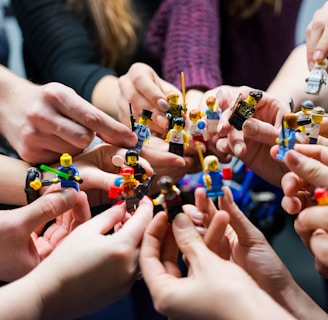Human skills
The Heartbeat of Effective Leadership and Team Success
Ross - Spark2Grow
8/31/20244 min read


In a world increasingly driven by technology and automation, it's easy to forget that the most valuable asset in any organization is its people. Recently, I had a conversation with a client who was grappling with leadership challenges. Despite his technical expertise, he felt a disconnect with his team and struggled to inspire them. It was only when he shifted his focus towards understanding and connecting with his team on a deeper level—by honing his human skills—that he began to see real progress.
Human skills, often overlooked, are the glue that holds teams together. They’re not just about being kind or polite; they’re about truly understanding and influencing people in a way that fosters collaboration, trust, and innovation. Whether you're a seasoned leader or an emerging professional, developing these skills is key to navigating the complexities of today’s workplace.
In this blog, we’ll explore the essential human skills that can elevate your leadership and enhance team dynamics. We’ll also provide practical tips for developing these skills, whether you’re working to improve your own interactions or guiding others to do the same. By the end, you’ll have a clear path to not only strengthen your human skills but also to cultivate a more cohesive and motivated team.
Key Human Skills to Develop:
Empathy: It is the ability to put yourself in someone else’s shoes, to understand and share their feelings. It’s the foundation of strong relationships. To develop empathy, practice active listening—really hear what others are saying without planning your response while they speak. Take time to acknowledge others' emotions and validate their experiences. As a leader, show that you care about your team’s well-being, which will foster loyalty and trust.
Communication: Clear and effective communication is essential for any successful team. It’s not just about talking; it’s about ensuring your message is understood. To enhance your communication skills, focus on clarity, be concise, and make sure to tailor your message to your audience. Encourage open dialogue in your team, where everyone feels their voice is heard and respected.
Emotional Intelligence (EQ): It is the ability to understand and manage your own emotions, as well as recognize and influence the emotions of others. To improve your EQ, work on self-awareness and self-regulation. Understand your emotional triggers and practice techniques to manage your reactions. Encourage emotional intelligence within your team by modeling calm and measured responses, especially in high-pressure situations.
Collaboration: It is the art of working together to achieve common goals. It’s about valuing the strengths each person brings to the table and leveraging them for the benefit of the team. To foster collaboration, encourage diversity of thought, promote inclusivity, and create opportunities for team members to work together on projects that capitalize on their unique skills.
Adaptability: In a constantly changing work environment, adaptability is crucial. It’s the ability to adjust your approach based on new information and changing circumstances. Develop adaptability by staying curious, being open to new ideas, and embracing change as an opportunity for growth. Lead by example, showing your team that flexibility and innovation are keys to success.
Recommended Reading:
"Emotional Intelligence 2.0" by Travis Bradberry and Jean Greaves offers practical strategies to boost your emotional intelligence, making it easier to navigate the emotional landscapes of the workplace.
"Dare to Lead" by Brené Brown explores how vulnerability, courage, and empathy are essential for effective leadership. This book provides a roadmap for developing these critical human skills.
"The Culture Code: The Secrets of Highly Successful Groups" by Daniel Coyle delves into what makes teams successful, highlighting the importance of human skills like trust and communication in building strong group dynamics.
"The 5 Dysfunctions of a Team" by Patrick Lencioni outlines common pitfalls that teams face and provides strategies to overcome them, emphasizing the role of trust, communication, and collaboration.
"Radical Candor: Be a Kick-Ass Boss Without Losing Your Humanity" by Kim Scott discusses the importance of honest communication in leadership while maintaining respect and empathy, offering actionable advice for balancing these critical human skills.


Human skills are the heartbeat of effective leadership and team success. By prioritizing empathy, communication, emotional intelligence, collaboration, and adaptability, you’re not just improving your own capabilities—you’re creating a positive, productive work environment where everyone can thrive. These skills are the foundation upon which great teams are built, and they are more important than ever in today’s rapidly changing workplace.
As we continue to explore the intersection of professional growth and personal development, we invite you to stay connected with us for more insights and tips. Follow us on social media for daily inspiration and practical advice, and don’t hesitate to share your thoughts and questions—we’re here to help you grow.
#Spark2Grow
To easily acquire the books mentioned, click on the titles listed below for direct access on Amazon:
